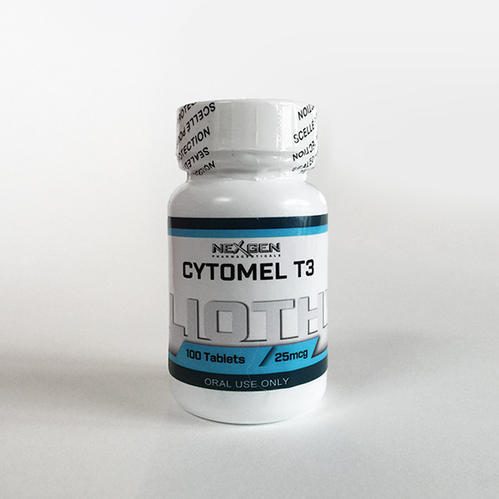Cytomel T3
The technical name of Cytomel T3 is Liothyronine. This is a synthetic hormone, and one that the body tends to respond well to. Studies indicate the body can’t tell if it is the real thing or not. As a result, it can get the hormone levels back in sync and it can help with the body functions that were compromised.
There are many reasons why the thyroid gland may be not producing what it should. This can include surgery, genetics, medications a person may be taking for other health concerns, or when they have been exposed to radiation therapy for other health concerns. Symptoms of low thyroid hormone include:
- Fatigue
- Aching muscles
- Dry skin
- Constipation
- Weight gain
- Sensitive to cold temperatures
Such symptoms should start to get better within a few ways to a few weeks on this medication. Share with your doctor how you are feeling so they know if you should continue it. Typically, they will ask you to try Cytomel T3 for a month to see how well it has helped you. If it isn’t working, a new medicine can be introduced.
Reasons to use
The main use of Cytomel T3 is for an underactive thyroid. This is commonly referred to as Hypothyroidism. When this occurs, the body isn’t making enough of the thyroid hormone. This medication can cause the body to feel like it is being naturally produced. The use of Cytomel T3 is sometimes considered for children who aren’t growing like they should be.
There are other types of thyroid concerns Cytomel T3 may be considered for. This includes cancer in that area of the body and even given in order to test for thyroid disease. If infertility is the result of low thyroid hormone levels, it may be part of that treatment plan as well.
Dosing
For most needs, Cytomel T3 is to be taken daily. For the bet results, it should be taken at the same time each day. It can be taken with or without food, but some patients experience an upset stomach or nausea if they take it on an empty stomach. Don’t skip doses and don’t change your dose without the consent of your doctor.
For thyroid related concerns, Cytomel T3 is likely going to need to be taken for the rest of your life. It won’t resolve the problem, but it will help to regulate the hormones so you don’t have problems. If you stop taking this medication, those hormone related concerns are going to return. The dose will vary, depending on the lab results for the individual.
The doctor is going to try to lowest amount of Cytomel T3 based on those lab results. The goal is to reduce the risk of side effects. If a person responds to their medication well, the dose may need to be increased to offer the optimum level of benefits.
Possible Side Effects
Most people tolerate Cytomel T3 well, but there can be some possible side effects to learn about. The higher the dose, the greater the risk of such issues developing. Temporary hair loss may occur as your body adjusts to the new thyroid hormones being introduced. This should taper off within a few months. Tell your doctor if it continues after that. Headaches can also be common in the first few weeks of use.
If you experience serve side effects with the use of Cytomel T3, talk to our doctor right away. They may need to reduce your dosage or change your medication. Such issues include:
- Anxiety
- Depression
- Diarrhea
- Menstrual cycle changes
- Sweating
- Sensitivity to heat
Very few people experience an allergic reaction to the use of Cytomel T3. Make sure you are aware of those symptoms. Should any develop, you need to seek immediate medical attention. They include:
- Swelling of the face, hands, or feet
- Rash
- Itching
- Dizziness
- Difficulty breathing
Make sure your doctor knows about any medications you are allergic to. This allows them to evaluate the ingredients in Cytomel T3 and identify if there is a potential risk to you by taking it.
Precautions
Not everyone is a good candidate for the use of Cytomel T3. If you have any of the following health concerns, it may not be recommended by your doctor:
- Heart disease
- Liver disease
- Kidney disease
- Diabetes
- Irregular heartbeat
- High blood pressure
Tell your doctor if you are pregnant as that an influence the use of Cytomel T3. It isn’t recommended to use it while pregnant or breastfeeding. There isn’t sufficient research to determine if it can be harmful to a fetus or a child.
Drug Interactions
It is vital to fully share with your doctor any medications you take. This includes herbal items and those you don’t need a prescription for. They also need to know about any others that are prescribed for you. Some products will reduce the effectiveness of Cytomel T3 so make sure the doctor is aware of what your intake consists of. Don’t add anything new until you get it approved by your doctor.
In some instances, you can still take your other medications, but they timing for them needs to be discussed. Your doctor may tell you not to take them within 4 hours of when you take the Cytomel T3. Make sure you understand this scheduling so you don’t reduce the value this medication can deliver. Individuals taking any type of blood thinner should not use Cytomel T3.










![Unlocking the Power of Trenbolone Acetate: Exploring the Uses of This Anabolic Steroid. What Does Tren Do? [And Trenbolone Side Effects]](https://x-steroids.com/wp-content/uploads/2023/12/Zrzut-ekranu-2023-12-17-105103-218x150.png)



